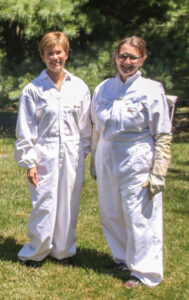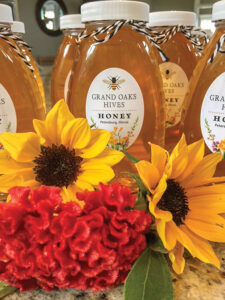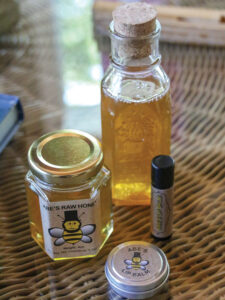“You get this love for them, and you’d do anything to help them survive,” says Nancy Bowman, talking about her beehives while wearing a t-shirt with a large bee across the front. Her friend, neighbor and fellow beekeeper Judy Ostermeier nods in agreement as her dangling bee earrings swing in approval.

Nancy and Judy of Petersburg, Ill. are both fairly new to beekeeping. Nancy is in her second year with three hives, and Judy is in her fourth year with four.
“I took the plunge first,” Judy says. “I retired and had time on my hands. I love to garden, and I love to be outside, so beekeeping sounded perfect for me.”
“I got into it for health and nutritional reasons, as well as a love for the environment,” Nancy says. “You start reading that bees are dying off, and we need them to pollinate. Not only do I eat tons of honey, beekeepers are needed.”
To start their journey, Nancy and Judy took a class with the U of I Extension. This is where they learned the basics of beekeeping, and it helped them get started with their own hives. They advise anyone interested in beekeeping to take this class.
After taking the class, it helps you order bees, which are purchased by the pound. Two hives are recommended for beginners just in case one fails. The bees are shipped in a box, this year from California, and there’s a queen in a small cage. A jar of sugar water feeds the bees in transit.
The colony and queen are then transferred to the brood box, which is the bottom box on the hive, and you need to make sure the queen begins laying eggs. Bees are considered livestock and need to be registered. An inspector will visit to check the overall health of the hives.
If they learned one thing during their time beekeeping, it’s that there’s no one way to care for bees. “We learned early on, if you ask 10 beekeepers the same question, you’ll get 10 different answers,” Nancy says. “And it’s true,” Judy responds. “I don’t know if there’s a right or wrong answer. A lot of these decisions are by the gut.”
They do a lot of research by searching the internet, watching YouTube videos and asking other beekeepers questions. But in the end, they’ve learned to trust their own instinct when making decisions.

“I have lost so much sleep,” Nancy says. “I found a bug in the hive. What am I going to do? Are they getting
too hot? Are they getting too cold? But you know what, they’ve done this for thousands of years. They are much smarter than I am. All I can do is control the problems in the hive. Judy comes to help, and the clubs are so supportive in Illinois. They will be there rain or shine. That’s very encouraging that first year.”
In Judy’s first year, she learned she was allergic to bees. “I got my bees, and then I got stung,” she says, remembering her arm ballooning. Instead of giving up on beekeeping, she goes to an allergist once a month for a shot. “And now when I get stung, not much happens.”
The biggest obstacle is keeping the colonies healthy. Varroa mites are a threat. “They will kill the bees,” Judy says. Nancy replies, “They will get on their backs and will suck the juice out of them. That’s scary for any beekeeper, to have something come in and wipe out their bees.”
The hives are inspected regularly for mites and treated to prevent an infestation. Other issues are disease and wax moths. “As long as your hive is healthy and there’s tons of bees, they pretty much take care of themselves,” Judy says. “But when they start weakening, that’s when the problems begin.”
Disease and pests aren’t the only problem for a beekeeper. Sometimes the whole colony will decide to leave. “I started with two hives last year,” Nancy recalls. “I babied them, and I knew what was going on. I had taken the honey for the last time, and then I went out there. You can usually hear them. I stood by the hive, and it was

dead silent. I lifted the top, and every bee was gone. I just felt like crying.”
Nancy and Judy explain that this is call absconding. The queen decides they need a new home, and every bee will pack up and move away in a swarm.
“There’s something, and don’t try to figure out what, that the queen feels is not right in the hive,” Nancy says. “I don’t know what it could have been. I had two hives and managed them both the same.”
This happened to Judy too, except she witnessed it. She said a swarm made a temporary landing, and then those bees collapsed like a cloud and flew away. She remembers hopping on her bicycle and taking off down the road after them.
“I don’t want anyone to get into this thinking it’s a cake walk,” Nancy says. “I would never discourage anyone, but people need to know there is a time commitment, a financial commitment and you need to have a desire to learn.”
For those interested in beekeeping, Nancy and Judy have a few tips. Check your local laws. Your town may not allow beehives in the community. Take a class to learn as much as you can before owning a hive. Find a mentor. You’ll need help, and many experienced beekeepers are happy to assist. Last, join a club. Having a network of beekeepers will be helpful. They recommend starting with the Illinois State Beekeepers Association.
If you don’t want a hive of your own, you can still help honeybees flourish. First, plant a variety of flowers that will bloom throughout the year, so bees can have a source of pollen.
Second, stop spraying herbicides and pesticides. “Please stop spraying,” Judy pleads. “Never spray a flower because that’s what the bees go to. Herbicides hurt the bees.”
Third, don’t fear bees. “They aren’t there to sting you unless you bother them,” Nancy says.
Beekeeping started out as an interest for the two women, and it has now turned into a lifestyle.
Nancy oftentimes finds herself photographing and studying her bees. “I just love learning about these fascinating creatures,” she says.
“I love having the honey and the health benefits,” Judy says. “But the enthusiasm from my family… They are proud to say grandma is a beekeeper. It is something unique, and I love it.”







